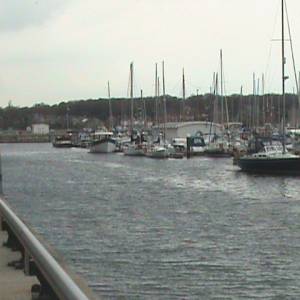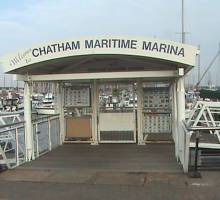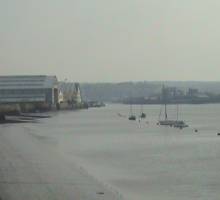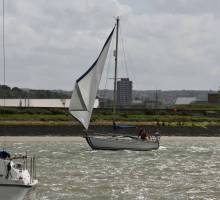
The Weather of late....
At this time of year we do have to venture out on many a cold day and Boatyards can be somewhat. The Boatshedmedway area is based along the River Medway in Kent and the wind is locally known for being somewhat viscious. As the River Medway passes down across North Kent it cuts into the chalk hills and as it meanders towards the sea, the prevailing wind is funnelled along where it gains speed until when it passes Chatham and the Medway towns it can practically cut through anything. Or at least that is what I think when the car door opens on another viewing or seatrial.
Fortunately the local boating fraternity are most hospitable and whenever I visit the likes of MDL at Chatham Maritime Marina, the kettle is usually working overtime and most importantly the central heating is on ‘full-blast’. So there I was in-between viewings and gazing at the small white horses that were slapping along the river when I wondered on what it might be like to be at sea when the air temperature was at or below zero and the wind chill was far below.
For me my mind would ponder on the great stories you hear of racing across the Southern Ocean or battling the wrong way around ‘Cape Horn’. Of perhaps greater mystery is that surrounding the ‘Northwest Passage’ which I read recently, had become clear due to diminishing sea ice. The search for this mystical route was long and harrowing with tragic stories of human suffering and bravery.
In fact, the search for this route lasted for some four centuries. After Columbus encountered the land barrier of the American continent there was a natural tendency to look for ways around and beyond. Many explorers ventured north and soon the hunt for a route connecting the North Atlantic with the Pacific captured the imagination. The start of any real searches should really be attributed to John and Sebastian Cabot who in the late 15th century were the first to make recorded landfalls on the North American Coast since the Norse voyages of the 11th Century. It was soon realised that the discovery of this route would open up trade with the Orient. In the early part of the 16th century, British Sailors went further north and recorded a lot of the Arctic features we know today. Many of these features were named after these explorers who included William Baffin, Henry Hudson and Martin Frobisher. On the first voyage of Martin Frobisher he reached Frobisher Bay which was near Baffin Island and returned with an Ore that was thought to contain gold! Two further expeditions were made with one containing fifteen ships. The prospect of gold was a great draw but the Ore was found to be worthless .. some kind of a fools gold.
Henry Hudson made a number of expeditions to various far flung locations and put his name to the American River otherwise known as the ‘Hudson River’. On or about 1610 he made a voyage towards the Northwest Passage. The expedition is known to have wintered in James Bay and then carried on until in June, it is understood that provisions ran low and the crew mutinied. Hudson was cast adrift with other crew members and was never seen again. There are numerous other trips which all failed with some grim stories of scurvy and other horrible endings. The Admiralty got involved in the 19th century and the search moved further north with expeditions being sent on the basis of science and geography but there was also suspicion that Russian ventures posed a threat to British Interests. In 1818 John Ross commanded British Naval ships to Baffin Island and Lancaster Sound. They concluded that a further trip along the sound was futile as it was likely to be enclosed and thus of no value. There were also overland expeditions at the same time which helped map these unknown coastlines. An expedition by John Franklin in 1819 pushed further forwards but they were caught out by short provisions and the weather. Discipline became strained and midshipman Robert Hood was murdered before the culprit was executed by the second in command. About ten sailors died of starvation in the struggle to get home. Adventurers continued to try, and Franklin himself perished in 1845. Franklin disappeared and numerous expeditions went forth to search for them over a number of years. They suffered a similar fate to all the others but the search parties inadvertently pushed the boundaries of the map even further and continued to provide more detail to the arctic coast and the search for the Northwest passage.
The passage itself was not successfully navigated until in 1903-06 Roald Amundsen made the first successful transit by sea. Amundsen went on to beat Scott to the South Pole but after completing the passage he did acknowledge all the ground work that had been completed by explorers who had gone before.
We can all look for the first signs of spring and after the most recent colds spells that have swept across most parts of the British Isles the forthcoming season will hopefully be more appreciated than others of late. Of course the weather in these fair lands will always remain unpredictable but I suppose we should not complain too much because clearly in other parts of the world it can be much worse.
If you are venturing out to meet Boatshedmedway this side of Easter I think the message is to wrap up warm and mind how you go....
Suzzanne McDonald
boats@boatshedmedway.com
Tel: 07940 583396




